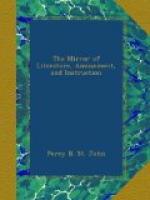Gross amount of the income of last year
L17,633[3]
Being an increase over the preceding year of
1,857
Receipts of four months of the past year
3,330
Receipts of corresponding months of the present year
3,755
Receipts of the Society since its formation
In 1827
L 4,079
1828
11,515
1829
13,991
1830
15,806
1831
17,662[3]
-------
Total since its formation
L63,053
Visiters to the Gardens.
In 1830—224,745 paying 9,773L
1831—258,936
11,425L
Visiters to the Museum.
In 1831—11,636 paying 333L
Number of Fellows 2,074
[3] These items, which are
not quite correct, are from the
Morning Chronicle report.
The Society have obtained a grant of nine acres and a half of land, in the Regent’s Park, contiguous to their gardens; and they intend to devote 1,000_l_. annually to the improvement of the Museum.
* * * * *
THE CURFEW BELL.
(To the Editor.)
Observing in your No. 543, some remarks relating to the ancient custom of ringing the Curfew Bell, and that Reginald, your correspondent, had withheld the name of the village where he heard the Curfew rang, I am led to suppose that it may not be uninteresting to your readers to be informed, that at Saint Helen’s Church, Abingdon, this custom is still continued; the bell is rung at eight o’clock every night, and four o’clock every morning, during the winter months; why it is rung in the morning I do not know; perhaps some of your readers can inform me. There are eight bells in Saint Helen’s tower, but the fifth or sixth is generally used as the Curfew, to distinguish it from the death-bell, for which purpose the tenor is used, and is rung at the same time at night if a death has happened in the course of the day, and for that night supersedes the necessity of ringing the Curfew. The Curfew Bell is rung, and not tolled, as Reginald states: therefore, what he heard, I suppose to have been the death bell. M.D.
(From another Correspondent.)
The custom of tolling the Curfew is still retained in the town of Sandwich, to which place your correspondent, Reginald, no doubt alludes, as the sea-shore is distant about two miles; hence is distinctly visible the red glare of the Lighthouse on Ramsgate Pier, as also the North Foreland. G.C.
* * * * *




